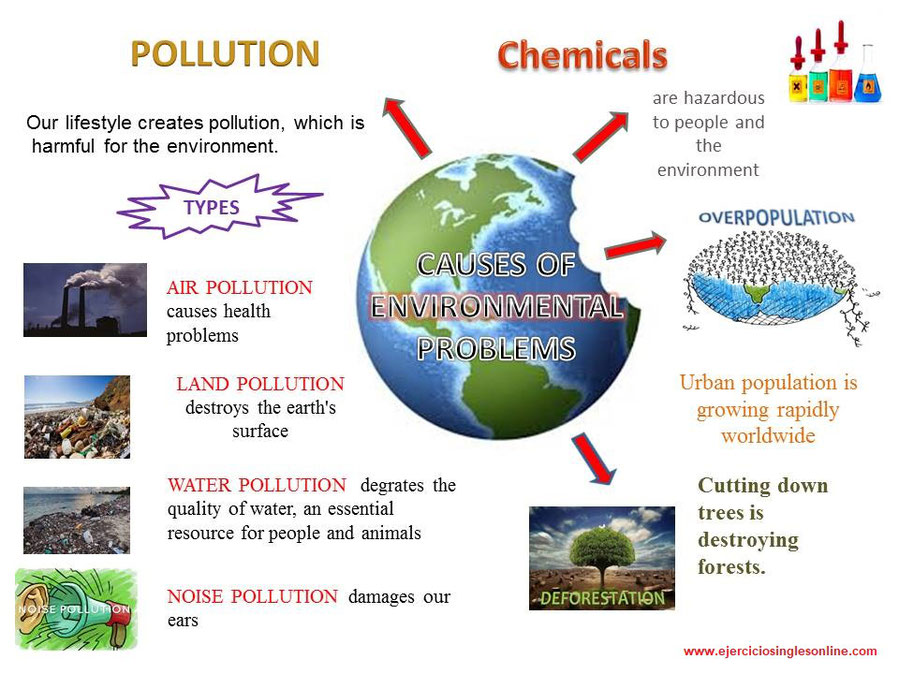Descripción: Vocabulario de ecología en inglés. Aprende vocabulario en inglés relacionado con desastres medioambientales. Esta lista de 30 palabras incluye términos para tsunamis, contaminación del aire, energía renovable y mucho más. Ideal para mejorar tu comprensión del inglés ambiental y participar en discusiones sobre cómo abordar estos problemas. ¡No te lo pierdas!

vocabulario
- Acid rain (ˈæsɪd reɪn) - Lluvia ácida
- Air pollution (ɛr pəˈluːʃən) - Contaminación del aire
- Climate change (ˈklaɪmɪt tʃeɪndʒ) - Cambio climático
- Deforestation (ˌdiːˌfɒrɪˈsteɪʃən) - Deforestación
- Desertification (dɪˌzɜːtɪfɪˈkeɪʃən) - Desertificación
- Ecological disaster (ɪˌkɒləˈdʒɪkəl dɪˈzɑːstə) - Desastre ecológico
- Emission (ɪˈmɪʃən) - Emisión
- Endangered species (ɪnˈdeɪndʒəd ˈspiːʃiz) - Especie en peligro de extinción
- Environmental impact (ɪnˌvaɪrənˈmɛntl ˈɪmpækt) - Impacto ambiental
- Fossil fuels (ˈfɒsl fjuːlz) - Combustibles fósiles
- Global warming (ˈɡləʊbl ˈwɔːmɪŋ) - Calentamiento global
- Greenhouse effect (ˈɡriːnhaʊs ɪˈfɛkt) - Efecto invernadero
- Habitat destruction (ˈhæbɪtæt dɪˈstrʌkʃən) - Destrucción del hábitat
- Industrial waste (ɪnˈdʌstrɪəl weɪst) - Residuos industriales
- Landfills (ˈlændfɪlz) - Vertederos
- Natural disaster (ˈnætʃrəl dɪˈzɑːstə) - Desastre natural
- Non-renewable resources (ˌnɒnrɪˈnjuːəbl rɪˈsɔːsɪz) - Recursos no renovables
- Nuclear energy (ˈnjuːkliər ˈɛnədʒi) - Energía nuclear
- Ocean pollution (ˈəʊʃən pəˈluːʃən) - Contaminación del océano
- Overfishing (ˌəʊvəˈfɪʃɪŋ) - Sobrepesca
- Ozone depletion (ˈəʊzəʊn dɪˈpliːʃən) - Agotamiento del ozono
- Plastic waste (ˈplæstɪk weɪst) - Residuos de plástico
- Radiation (reɪdiˈeɪʃən) - Radiación
- Renewable energy (rɪˈnjuːəbl ˈɛnədʒi) - Energía renovable
- Soil erosion (sɔɪl ɪˈrəʊʒən) - Erosión del suelo
- Solar power (ˈsəʊlər ˈpaʊər) - Energía solar
- Sustainable development (səsˈteɪnəbl dɪˈvɛləpmənt) - Desarrollo sostenible
- Toxic waste (ˈtɒksɪk weɪst) - Residuos tóxicos
- Water pollution (ˈwɔːtər pəˈluːʃən) - Contaminación del agua
EJERCICIO 1
The Last Polar Bear
In the year 2050, the last polar bear on Earth took its final breath. It was a somber moment for humanity, but it was also a moment of reckoning. We had been warned for years about the impact of global warming and the dangers it posed to our planet, yet we chose to ignore the warnings.
The melting of the polar ice caps was just one of the consequences of our disregard for the environment. Rising sea levels, extreme weather conditions, and the extinction of countless species were just a few of the other devastating effects.
But it wasn't too late to make a change. We had the technology and the knowledge to make a difference. We had the power to reduce carbon emissions and invest in renewable energy sources. We could have saved the polar bear and prevented the worst of the consequences of global warming.
As we mourned the loss of the last polar bear, we knew that we had a responsibility to act. It was up to us to ensure that no other species would suffer the same fate. It was up to us to make sure that our planet would be a safe and habitable place for future generations. The time for action was now, before it was too late.
1. What happened to the last polar bear in the year 2050?
a. It migrated to a different location.
b. It took its final breath.
c. It was captured and put in a zoo.
d. It gave birth to cubs.
2. What were some of the consequences of not heeding warnings about global warming?
a. Extreme weather conditions.
b. An increase in polar bear populations.
c. A decrease in carbon emissions.
d. An investment in nonrenewable energy sources.
3. What did we have the power to do in order to prevent the worst of the consequences of global warming?
a. Reduce carbon emissions and invest in renewable energy sources.
b. Increase carbon emissions and invest in nonrenewable energy sources.
c. Build more coal-fired power plants.
d. Ban the use of solar and wind power.
4. What did we know as we mourned the loss of the last polar bear?
a. That it was too late to make a change.
b. That global warming was a myth.
c. That we had a responsibility to act.
d. That the planet was beyond saving.
5. When was the time for action according to the text?
a. Before the year 2050.
b. After the extinction of the last polar bear.
c. Whenever was convenient.
d. Now, before it was too late.
ANSWERS:
- Answer: b.
- Answer: a.
- Answer: a.
- Answer: c.
- Answer: d.
